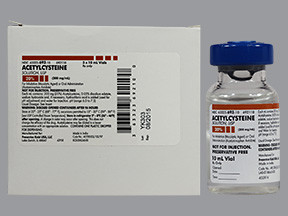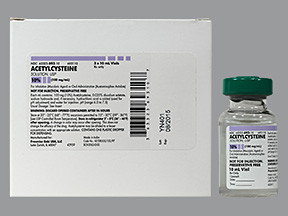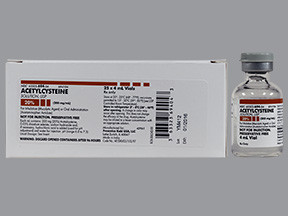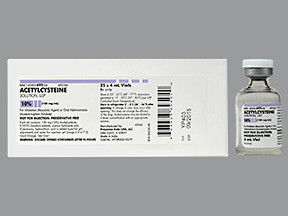ACETYLCYSTEINE - INHALATION/ORAL
PHONETIC PRONUNCIATION: (a-SEET-il-SIS-teen)
COMMON BRAND NAME(S): Mucomyst
GENERIC NAME(S): acetylcysteine
Uses
USES: When inhaled by mouth, acetylcysteine is used to help thin and loosen mucus in the airways due to certain lung diseases (such as emphysema, bronchitis, cystic fibrosis, pneumonia). This effect helps you to clear the mucus from your lungs so that you can breathe easier. When taken by mouth, acetylcysteine is used to prevent liver damage from acetaminophen overdose.
How to use ACETYLCYSTEINE - INHALATION/ORAL
HOW TO USE: If you are using this medication to treat lung disease, inhale this medication by mouth as directed by your doctor. A health care professional will show you the proper way to use this medication. Learn all preparation and usage instructions. You may notice a slight odor when you first breathe in the medication. This odor will quickly go away. If you are using a face mask to breathe in the medication, there may be some stickiness on your face after use. Wash your face with water to remove the stickiness. Do not mix acetylcysteine with other inhaled medications unless directed by the doctor or pharmacist. If you are taking this medication by mouth, take it as directed by your doctor. The solution is usually mixed with another liquid (such as cola) to decrease nausea and vomiting. Drink the medication within 1 hour of mixing. Tell your doctor if you vomit within 1 hour after taking your medication. You may need to take another dose. The dosage is based on your medical condition and response to treatment. For acetaminophen overdose, the dosage is also be based on your weight. Tell your doctor if your condition does not improve or if it worsens.
Side Effects
Precautions
Interactions
Overdose
Images
Reviews
Faq for ACETYLCYSTEINE - INHALATION/ORAL
- Acetylcysteine is used to treat acetaminophen (paracetamol) overdose and to thin and loosen mucus in the lungs and airways in conditions such as chronic bronchitis, cystic fibrosis, and pneumonia.
- Acetylcysteine works by replenishing the levels of a substance called glutathione, which is important for detoxifying harmful substances in the body. It also helps to break down and thin mucus, making it easier to cough out.
- Acetylcysteine is generally considered safe to use during pregnancy. However, it is always recommended to consult with a healthcare provider before starting any medication during pregnancy.
- The common side effects of acetylcysteine include nausea, vomiting, stomach upset, and headache. In some rare cases, it may cause bronchospasm (wheezing) or an allergic reaction.
- Acetylcysteine may interact with certain medications like nitroglycerin, medications containing nitrites, and certain blood pressure medications. It is important to inform your doctor about all the medications you are taking before starting acetylcysteine.
- Acetylcysteine can be administered through inhalation or orally. The inhalation form is typically delivered using a nebulizer, while the oral form is available in solution or effervescent tablet form.
- The onset of action of acetylcysteine varies depending on the condition being treated. In cases of acetaminophen overdose, it is usually started immediately to prevent liver damage. For respiratory conditions, it may take several days of regular use to see the desired effects.
- Acetylcysteine is available both as a prescription medication and as an over-the-counter supplement. However, the dosage strength and usage for specific conditions may require a prescription, so it is advisable to consult a healthcare professional.
- Acetylcysteine can be used in children, but the dosage and administration may differ based on their age and weight. It is important to follow the doctor's instructions and discuss any concerns with your child's healthcare provider.
Disclaimer
IMPORTANT: HOW TO USE THIS INFORMATION: This is a summary and does NOT have all possible information about this product. This information does not assure that this product is safe, effective, or appropriate for you. This information is not individual medical advice and does not substitute for the advice of your health care professional. Always ask your health care professional for complete information about this product and your specific health needs.




No Reviews Yet